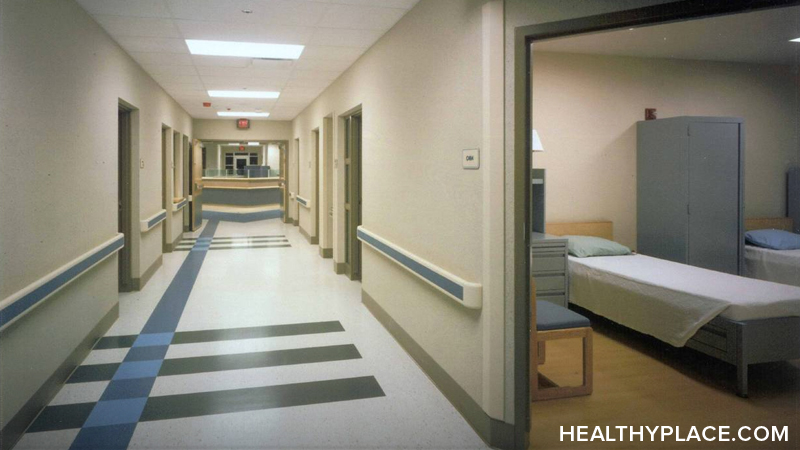Psychiatric Hospitalization

Detailed overview of psychiatric hospitalization. Why psychiatric hospitalization is needed, what to expect, involuntary commitment to a psychiatric hospital and more.
Facts About Psychiatric Hospitalization
Hospitalization for psychiatric illness has undergone revolutionary changes in the last three decades. At mid-century, there were two basic sources of care for people with mental illnesses: a psychiatrist's private office, or a mental hospital. Those who went to the hospital often stayed for many months, even years. The hospital, frequently operated by the state, offered protection from the stresses of living which could be overwhelming for those with severe illness. It also offered protection from self-inflicted harm. But it offered little in the way of treatment. The use of medication as a mainstay of rehabilitative treatment had just begun.
Today people with a mental illness have many treatment options depending upon medical need:
- 24-hour inpatient care in general hospital psychiatric units,
- private psychiatric hospitals,
- state and federal public psychiatric hospitals;
- Veterans Administration (VA) hospitals;
- partial hospitalization or day care;
- residential care; community mental health centers;
- care in the offices of psychiatrists and other mental health practitioners, and
- support groups.
In all these settings, health care professionals work very hard to provide care according to a treatment plan developed by each patient's psychiatrist. The goal is to restore maximum independent living as rapidly as possible, using the appropriate level of care for the appropriate illness. Frequently, the family is involved as part of the treatment team.
Today, people turn to psychiatric hospitals for help with a wide range of mental illnesses: families coping with the ravages of addiction; a young mother or a grandfather fighting depression; a girl whose eating disorder has put her life in danger; a young executive who cannot shake compulsions that threaten to take over his life; a once-prominent attorney who is nearly a prisoner in her own home because of phobias and anxiety; a veteran of the Vietnam war who can't seem to get over the pain of his past; a youngster whose uncontrollable and destructive behavior threatens to tear her family apart; a college freshman who is frightened and confused by strange voices and delusions.
When Psychiatric Hospitalization is Needed
A psychiatrist's decision to admit a patient to the hospital depends primarily on the severity of the patient's illness. No one is sent to the hospital who can better be treated in the psychiatrist's office or in another less restrictive setting. The presence or absence of social support--family members or other caretakers--can also figure in the psychiatrist's decision to hospitalize a patient. With sufficient social support, a person who might otherwise require hospitalization can often be cared for at home.
In much the same way a physician decides to hospitalize a person for other medical illnesses, the psychiatrist--who is a medical doctor--evaluates the symptoms to determine a treatment plan and the most appropriate treatment setting.
The procedure for hospital admission for a psychiatric illness resembles that for other illnesses. Often, that means a person's health insurance company may require a pre-admission certification before agreeing to pay for a hospitalization. Working with the psychiatrist, insurance company staff will review a patient's case and decide if it is serious enough to require inpatient care. If so, they will approve admission for a limited hospital stay, then periodically review the patient's progress to determine whether the stay should be extended. If care is denied, the psychiatrist and patient may appeal.
What to Expect in a Psychiatric Hospital
Many psychiatric hospitals and mental health units of general hospitals provide the full range of care, from psychotherapy to medication, from vocational training to social services.
Hospitalization reduces the stresses of responsibility for the patient for a brief time and allows the person to concentrate on recovery. As the crisis lessens and the person is better able to assume the challenge, the mental health care team can help him or her to plan for discharge and the community-based services that will help him or her to continue recuperating while living at home.
People in the hospital receive treatment that follows a plan developed by the psychiatrist. The therapies outlined in that plan may involve a variety of mental health professionals: the psychiatrist, a clinical psychologist, nurses, social workers, activity and rehabilitation therapists and, when necessary, an addiction counselor.
Before psychiatric treatment in any hospital begins, a patient undergoes a complete physical examination to determine the overall state of his or her health. Generally, once treatment begins, patients in the hospital receive individual therapy with a primary therapist, group therapy with peers, and family therapy with spouse, children, parents or other significant people. At the same time, patients often receive one or more psychiatric medicines. During therapy sessions, a patient can develop insights into his or her emotional and mental functioning, learn about his or her illness and its effect on relationships and daily living, and establish healthy ways of responding to the illness and daily stresses that can affect mental health. In addition, patients can receive occupational therapy to develop skills for daily living, activity therapy to learn how to develop healthy social relationships in the community, and drug and alcohol evaluation. Throughout the hospital stay, each patient works with his or her treatment team to put together a plan for continued care after the hospital stay is over.
Residential treatment programs are categorized as either medically based or socially based. In medically-based programs patients receive very structured care, including such services as medically necessary supervision and psychotherapy. In socially based programs patients receive psychotherapy, but also learn how to take advantage of community support systems and increase their independence. For example, under a socially based program, patients learn how to apply for government medical assistance that will enable them to get psychiatric and medical services in the community rather than relying on hospitalization for help.
Residential care can also help patients to learn how to maintain a household, cooperate with other residents and work with social and health agencies to get the services they need. This, in turn, improves their self-esteem and confidence.
Hospital personnel pay careful attention to the physical well being of patients. Hospital physicians and nurses monitor the patient's medications, and, with those patients whose severe illnesses may make them a danger to themselves or other patients, take steps to protect them from injury. This can sometimes mean use of restraints or isolation from other patients, measures that are used to protect, not to punish, and only for very brief periods of time. Hospital personnel also work to be sure each patient understands the importance of good nutrition and knows the dietary restrictions that may be necessary because of his or her medications.
Length of Stay
Today the average length of stay for adults in a psychiatric facility is 12 days. The mental health care team and patient begin planning for discharge on the first day of admission. Because medical research has produced highly effective treatments, people who suffer from mental illness today recover from severe episodes much more quickly than in the past.
Likewise, people who suffer from alcohol and substance abuse no longer routinely stay in residential treatment centers for prolonged periods of time. Most recover with short-term stays that average 10 days, followed by partial hospitalization, outpatient and support group services.
Other Psychiatric Hospitalization Options
Once psychiatric treatment stabilizes a patient's condition, he or she may progress to a less-intensive treatment setting. The psychiatrist may recommend partial hospitalization. This option isn't limited to people who are ending a hospital stay; it also meets the needs of people who live in the community and need a higher level of care without the services of overnight, 24-hour nursing.
Partial hospitalization provides individual and group psychotherapy, social and vocational rehabilitation, occupational therapy, assistance with educational needs, and other services to help patients maintain their abilities to function at home, at work and in social circles. However, because their treatment setting helps them to develop a support network of friends and family that can help monitor their conditions when they are not in the hospital, they can return home at night and on weekends. Partial hospitalization or day treatment works best for people whose symptoms are under control. They enter care directly from the community or after being discharged from 24-hour care.
Partial hospitalization is most effective for patients who are ready for therapy and rehabilitation that can move them comfortably back into the community. It is also less expensive. A full day of partial hospitalization costs, on average, $350--roughly half the cost of 24-hour inpatient treatment, according to Health Care Industries of America, a health care consulting company.
When Children Need Psychiatric Hospital Care
Children and teenagers can have mental illnesses. Some of these illnesses--such as conduct disorder and attention-deficit/hyperactivity disorder--usually emerge during these early years. Youngsters also can suffer with illnesses most people would associate first with adults, such as depression or schizophrenia. And like those of adults, children's illnesses can go into remission or worsen from time to time.
When a child's symptoms become severe, a psychiatrist may recommend hospitalization. The physician will consider several factors in making the recommendation:
- Whether the child poses an actual or imminent danger to him or herself or others;
- Whether the child's behavior is bizarre and destructive to the community;
- Whether the child requires medication that must be closely monitored;
- Whether the child needs 24-hour care in order to become stabilized;
- Whether the child has failed to improve in other, less restrictive environments.
As with adults, children receiving inpatient care will have a treatment plan that identifies the therapies and goals unique to each child. The treatment team will work with each child in individual, group and family therapy as well as occupational therapy. Youngsters are also often involved in activity therapy, which teaches social skills, and drug and alcohol evaluation and treatment. In addition, the hospital will provide an academic program.
Because the family is integral to a child's recuperation, the treatment team will work closely with parents or guardians to ensure good communication and understanding about the illness, treatment process and recovery prognosis. Families will learn how to work with their children and cope with the stresses that can develop with a serious or chronic illness.
Involuntary Treatment - Commitment to a Psychiatric Hospital
The National Association of Psychiatric Health Systems reports that about 88 percent of adults treated in its members' hospitals are admitted voluntarily. In many states, people so disabled by their illnesses that they don't fully recognize the need for 24-hour inpatient care and who refuse hospital treatment may be involuntarily admitted to the hospital, but only with the knowledge of the court system and following an examination by a physician.
Commitment procedures vary from state to state. There has been some attempt made to shield mentally ill people from the stigma of public court appearances, and sometimes patients can be too ill to attend a hearing. For these reasons, a mentally ill person may, in some states, be admitted on the advice of one or two physicians who act within a very strict set of procedures to insure full protection of the patient's legal rights. Most states allow a physician to prescribe that a person be admitted involuntarily to a hospital for a brief evaluation period, usually three-days.
During the evaluation period, a team of psychiatrists and mental health professionals can learn whether the person's illness requires longer hospital care or can be managed effectively with less intensive treatment, such as partial hospitalization.
If the evaluation team thinks a patient requires inpatient care past the three-day period, it can request longer admission--a request that, it should be emphasized, is subject to a hearing. At this hearing, the patient or his or her representative must be present. No decisions regarding a patient's hospitalization and subsequent treatment can be made without the presence of the patient or this representative. If involuntary admission is recommended, the court can issue an order for only a specific period of time. At the end of that period, the question of hospitalization must again go to a court hearing.
Involuntary treatment is sometimes necessary, but is used only in unusual circumstances and is always subject to a review which protects the civil liberties of patients.
There if You Need it
If your physician prescribes hospitalization, you, a member of your family, a friend or other advocate should tour the recommended facility and learn about its admissions procedure, daily schedules and the mental health care team with whom you or your family member will be working. Learn how treatment progress will be communicated and what your role will be. This may help you to feel more comfortable about complying with your physician's recommendation. And that comfort can only contribute to the progress you or your loved one will make during hospital care.
Regardless of the illness, it's good to know that a range of health care services are available for patients and their families. Certainly, outpatient care is the most common treatment setting. But when an illness becomes severe, effective hospital services are there to meet the need.
(c) Copyright 1994 American Psychiatric Association
Produced by the APA Joint Commission on Public Affairs and the Division of Public Affairs. This document contains text of a pamphlet developed for educational purposes and does not necessarily reflect opinion or policy of the American Psychiatric Association.
Additional Resources
Dalton, R. and Forman, M. Psychiatric Hospitalization of School-Age Children. Washington, DC: American Psychiatric Press, Inc., 1992.
Consent to Voluntary Hospitalization: Report of the American Psychiatric Association Task Force on Consent to Voluntary Hospitalization. Washington, DC: American Psychiatric Press, Inc., 1992.
Facts for Families Information Sheet Series, "Children's Major Psychiatric Disorders," and "The Continuum of Care." Washington, DC: American Academy of Child and Adolescent Psychiatry, 1994.
Kiesler, C. and Sibulkin, A. Mental Hospitalization: Myths and Facts About A National Crisis. Newbury Park, CA: Sage Publications, 1987.
Korpell, H. How You Can Help: A Guide for Families of Psychiatric Hospital Patients. Washington, DC: American Psychiatric Press, Inc., 1984.
Krizay, J. Partial Hospitalization: Facilities, Cost & Utilization.Washington, DC: The American Psychiatric Association, Inc., 1989.
Policy Statements on Inpatient Hospital Treatment of Children and Adolescents. Washington, DC: American Academy of Child and Adolescent Psychiatry, 1989.
APA Reference
Staff, H.
(2009, January 3). Psychiatric Hospitalization, HealthyPlace. Retrieved
on 2024, November 20 from https://www.healthyplace.com/other-info/psychiatric-disorder-definitions/psychiatric-hospitalization


